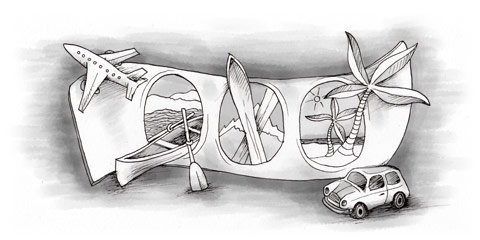Needless to say, however, Japanese cars have become popular in recent years (Toyota have built a manufacturing plant in Valenciennes), while Fiat and Audi/VW are the best-selling foreign makes, and the two main French manufacturers, Renault and Peugeot-Citroën, which once shared three-quarters of the domestic market have suffered declining sales.
The availability of local service facilities is, of course, linked to the number of cars sold in France. Peugeot-Citroën and Renault dealers can be found in every large town and there many Audi-VW, Fiat, Ford, Mercedes and Opel (General Motors/Vauxahll) dealers. Dealers for other makes are few and far between. It’s difficult to find garages that can repair US, British and some Japanese cars, and the nearest dealer may be a long way from your home or workplace.
If you buy a rare car, it’s wise to carry a basic selection of spare parts, as service stations in France may not stock them and you may need to wait several days for them to be sent from abroad. On the other hand, if you’re buying a French-made car with the intention of using it abroad (e.g. in the UK), check that you will be able to find spare parts for it. France’s most popular car, the Renault Twingo, for example, isn’t sold in the UK and so repairs and servicing may be expensive or impossible.
The cost of running a car (e.g. insurance, taxes, petrol, servicing and depreciation) in France is among the highest in the EU. Those contemplating buying a ‘sports utility vehicle’, known in France as a ‘ quat-quat’ (short for quatre-quatre, meaning four-by-four), should note that the government is planning to impose a purchase tax of up to €3,500 on such vehicles, whereas purchasers of ‘green’ cars (those that emit less than 140g of carbon monoxide per km) may be entitled to a rebate of up to €700.
New Cars
New car prices are higher in France than in most other European countries, although lower than those in the UK, and many French people buy their cars in Belgium or Portugal, where most new cars are up to 20 per cent cheaper than in France. You should make sure, however, that the local French dealer of a car purchased abroad will agree to service it under the terms of the warranty. Since 1st October 2002 dealers have been allowed to operate anywhere in the EU and price differences should largely disappear within a few years. Personally importing a car from the US is usually much cheaper than buying the same car in France or elsewhere in Europe but you must ensure that it’s manufactured to French specifications or it may not be approved by the DRIRE.
Making comparisons between new car prices in those countries which have adopted the euro currency is easy, but attention should be paid to the different levels of standard equipment and warranty levels. Most dealers will offer one or two extras free of charge, giving up to a 10 per cent discount on the list price, and some offer ‘cash back’ deals; you should shop around for the best package. The French government occasionally provides a subsidy (e.g. up to €760) for owners of old bangers who buy new cars (designed to help French car manufacturers), and some dealers offer a hire purchase option ( vente à crédit).
All new cars sold in France must now be labelled with their ‘energy efficiency’ (i.e. the amount of carbon dioxide their engines emit for every kilometre travelled), with colour codes ranging from dark green for the most environmentally-friendly models (emissions of less than 100g/km) to red for the most polluting (over 250g/km) and there’s a surcharge on the cost of a registration document for high-emission cars.
Environment factos
The environmentally-conscious can do even better than buying a dark-green-label car and invest in a vehicle that runs on a mixture of propane and butane, known as liquid-petroleum gas (LPG – gaz de pétrole liquéfié, GPL or Gépel in French), or convert a conventional car to run on LPG, which produces less harmful emissions than petrol, including around 15 per cent less carbon dioxide as well as less carbon monoxide. There are around 200,000 LPG-powered cars on French roads, and they’re manufactured by Daihatsu, Ford, Rover, Opel and others. Although new LPG cars cost around €1,600 more than ordinary cars (and conversion of an ordinary car costs between €2,000 and €3,500), tax credits of between €1,525 and €2,300 are available and fuel costs around half as much as petrol, so that major savings can be made. Engine wear and noise are also reduced.
Note, however, that LPG-powered cars aren’t permitted to use certain road tunnels and there have been a number of spectacular explosions involving LPG-powered vehicles. The Guide GPL is available from petrol stations supplying LPG and from the Comité Français du Butane et du Propane (www.cfbp.fr ). If you live in Paris, you can even buy an electric car (which are tax-free and entitled to free parking) – and hope that the promised 100 charging points are installed before your batteries go flat!
A recent initiative, pioneered by Gaz de France and Citroën in the department of Haute-Garonne in late 2005, allows drivers of a new version of the C3 car to fill it with mains gas (known as gaz naturel de ville/GNV to distinguish it from LPG), costing roughly the same as diesel and charged to your home gas bill; like LPG, mains gas generates significantly lower emissions than petrol. GNV is used by over 1,000 French buses, two of which caught fire in 2005 as a result of faulty safety valves.
It’s possible to buy a car in France for which you don’t require a licence. But that’s about the only advantage of these vehicles (known officially as voiturettes but colloquially as sans permis – an allusion to illegal immigrants, who are known as sans papiers); the disadvantages are that they’re tiny (strictly two-seaters with no boot), have an official top speed of around 60kph/40mph (although downhill with a following wind they can reach a hair-raising 80kph/50mph), aren’t allowed on motorways or dual-carriageways and cost an alarming €7,500 for even a basic model. There is, however a lively second-hand market in sans permis vehicles, which are often changed every two years.
Used Cars
Used cars ( voiture d’occasion) in France are expensive in relation to new cars and generally more expensive than in the UK, for example. It’s often best to buy a car that’s around two years old, as depreciation in the first two years is considerable. If you intend to buy a used car in France, whether privately or from a garage, check the following:
- That it has passed the official technical inspection, if applicable.
- That it hasn’t been involved in a major accident. A declaration that it’s accident free ( sans accident/non-accidenté) should be obtained in writing.
- That the chassis number tallies with the registration document, which should be in the name of the vendor when sold privately.
- That the service coupons have been completed and stamped, and that servicing has been carried out by an authorised dealer.
- That the price roughly corresponds to those in the weekly Argus guide.
- That you receive a guarantee, signed by the vendor, that the car isn’t under a hire purchase agreement ( certificat de non-gage).
- That you also receive a certificat de non-opposition confirming that the vendor agrees to sell you the car (i.e. you aren’t stealing it!).
- Whether a warranty or guarantee is available; if so, obtain the relevant documents.
A certificat de non-opposition is valid for two months and a certificat de non-gage for one month only and you must re-register the car within this period. A certificat de non-gage can be obtained from your préfecture or via the internet (www.interieur.gov.fr ). Never buy a car without a registration document, as it could be stolen.
Car dealers give warranties of 3 to 12 months on used cars depending on the age of the car and the model. Used car dealers, rather than franchised dealers, have the same dreadful (and well-deserved) reputation as in other countries and caution must be taken when buying from them. If you’re buying a used car from a garage, try to negotiate a reduction, particularly when you’re paying cash and aren’t trading in another vehicle.
All national and local (including free) newspapers carry advertisements for used cars. Specialist journals for used-car buyers include the monthly Auto Journal (www.autojournal.fr ). La Centrale des Particuliers (www.lacentrale.fr ) and L’Argus magazine (www.argusauto.com ) are published weekly, and the latter includes a guide to second-hand car prices.
L’Argus updates its prices every six months and these are used throughout the industry, e.g. by dealers buying or selling cars and by insurance companies when calculating values for insurance premiums and claims. You should pay within around 10 per cent of the Argus value, depending on condition and the certified kilometre reading. Second-hand prices vary with the region and are generally higher in remote areas than in Paris and other major cities.
Note that all cars containing parts made from asbestos ( amiante) are illegal (i.e. no one is allowed to buy or sell them) owing to the health threat posed to mechanics. As most pre-1997 vehicles have brake and clutch pads and gaskets containing asbestos, you should ask the seller for confirmation that asbestos parts have been replaced. If in doubt, have the vehicle checked before buying it.
This article is an extract from Living and working in France. Click here to get a copy now.


